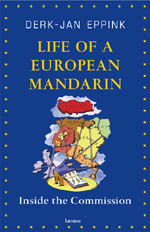“Humour and the European Commission are never associated.” Dutch journalist and former EC bureaucrat Derk-Jan Eppink nevertheless gave it a shot in his book ‘The Life of a European Mandarin’ in which he offers an insider’s view on the most powerful of European institutions.

“Most books about the European Commission are very complicated and are only read for work or studies, never by choice”, argues Eppink. So when he was asked to write a book about the Commission that would interest a broader audience, he took on the challenge. He started writing about the microcosms of the Commission, where there are only people of good intention. The European Union is an empire, but as EC president Barroso has already stated, we are a good empire.
The attitude of this administration empire would be, according to Eppink, a little bit elitist. The mandarins, as he calls the European officials, think that there is only the Commission and the rest of the world. Eppink should know. He worked in the cabinets of two European Commissioners, Dutchman Frits Bolkenstein and Estonian Siim Kallas.
For Eppink, the European Parliament is a little different from the European Commission, which is a very closed and mysterious world. In the European Parliament a journalist can find a good story or a scandal without many problems and the Parliament also gives the people the opportunity to make their voice heard. “By referendum for example. The Irish will soon get the opportunity to vote yes for the second time”, he quips.
“Empire of good intention”, “a closed world”, “difficult to get inside”, “no transparency” and “the leading Europeans” are the words that he uses to describe the image that the European citizens have of Europe. The Commission considered introducing more transparency but “most commissioners were against more transparency because it gives too much information to the people”, says Eppink. He even goes so far as to compare the Commission with the closed entity of the soviet communist party.
Everybody leaks
“If you are working at the Commission, you have to read, decrypt and understand the commission style documents and they are not like a novel”, says Eppink. The European language is a code language and you have to read between the lines. To have information about it, you have to speak to spokespersons but they can’t tell you the whole truth, they only tell you part of the story. The use of the language by these spokespersons is very strange, they take care of every word. “At the commission, you are never joking because it’s dangerous. Be careful”, warns Eppink.
In fact, the administration carefully chooses the information it gives to the spokespersons, the go-betweens who manipulate the information in many ways. “Everybody leaks. The better is that you are leaking first.” The motto of the Commission’s communication is that they are important, that the citizens have to see what they do for them and have to be grateful for this. According to Eppink, investigative journalism improves the communication about the Commission for the citizen. For Eppink, to report about the Commission is like a report of a football match. “Germany thinks this, the Britons say that, it’s always the battle of the member states.”
Be careful, he warned us earlier, “Everything is watched by the security service of the Commission, today’s Stasi.” Eppink told us that, when he was working at the Commission, a security official had asked him if he had given some confidential information to a journalist of the Financial Times. To prove his case he showed Eppink a printout of the e-mail traffic of the six last months between him and this journalist. So some good advice: never e-mail any secret information at the Commission.
Posted in | 03.12.2008
By: Marie Deblonde



